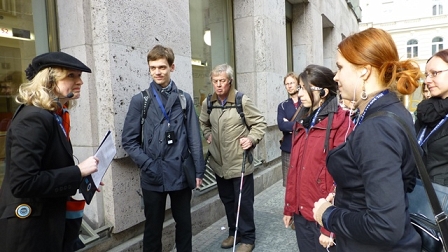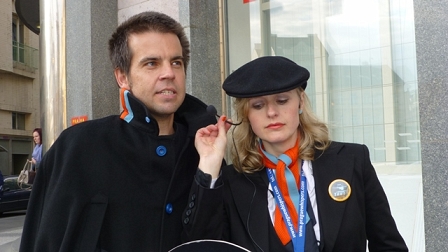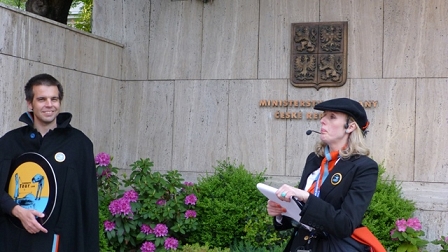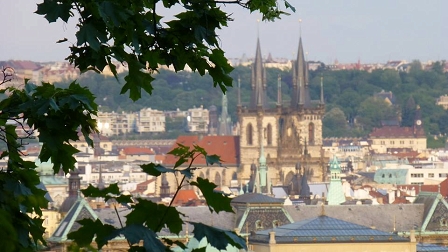Erstellt am: 29. 5. 2013 - 15:50 Uhr
Fighting Corruption With Sarcasm
Dressed in tall black boots, a black cloak with a large flat cap atop her flowing blond hair Edita Čechová guides me around what she calls Prague's “Monuments of Corruption”. She masquerades as an admirer of corruption, which she describes as part of the “Czech national heritage”. A trained actress, Edita gesticulates wildly as she outlines the apparent genius of the scams that have channelled Czech tax-payers money in the private pockets of those in power. To symbolise that politicians from both the left and the right have their heads in the trough, Edita is wearing an orange and blue scarf, the colours of the two biggest political parties. Her performance is a bitingly ironic attack on a culture that many Czech's feel has become endemic.
“My role is to be sarcastic,” she tells me later, “to make fun of this very bad thing, to use humour to speak to people in a way that is more effective than just complaining about the political system.”

chris cummins
Edita works for Corrupt Tours, a mock travel agency set up just over a year ago by Petr Sourek, claiming to offer an experience that is “entirely unique in the history of tourism.” Petr has joined today's tour, supporting Edita with the details. Glowering in the background with the tall collar of his coat pulled up against the unseasonably chill wind he looks like an impish count.
Petr delights in his self-appointed role as an exploiter of the exploiters. He says corruption, being apparently “limitless and renewable”, is an excellent “raw material” for his team's theatrical performances, for which he charges 27 euros for every participant. Unabashed about pursuing protest as a business model, he explains with a grin that “usually corruption feeds on business, so we thought we would reverse that trend and make money out of corruption.”

chris cummins
The Czech Republic has faced a series of corruption scandals in recent years and this has severely eroded public trust. According to a poll conducted by the Public Opinion Research Centre (CVVM) in March, some three-quarters of Czechs believe that most or almost all public officials are entangled in corruption. Radim Bureš, Project Manager at the Czech branch of Transparency International, says that around a quarter say they have come across corruption in their everyday lives. He says the procurement of hospital equipment is often severely overpriced because of kick-backs and says that if a company wants to secure a contract they might be asked for a bribe.
There have been high-profile cases that have scandalised the population. Radim Bureš mentions a municipal police chief who asked for a bribe from the mechanics firm given the job of maintaining the city's fleet of police cars. He describes how subsidies from European Union funds are thought to have been misused to build hotels. But Czech corruption can be more mundane: “Another good example is that if someone is asking to get planning permission for a building, someone asks for a bribe not to create an artificial obstacle.” Such incidents have meant that Czech Republic ranks only as the 54th least corrupt nation in Transparency International's latest world corruption index, with a worse record than Rwanda and Georgia. It's one of the worst ratings of any EU member nation.

chris cummins
Edita says she joined the team because she wanted to be an engaged citizen and to fight back against corruption. She sees it as “a soft form of protest”. The activists use humour to expose the absurdity of the way public money is channelled into private pockets. “Corruption is not funny,” she says, “but humour is a good way of pointing the finger.”
Monuments of Notoriety
The tour drops in on the city hall on Mariánské Square, dubbed Mafiánské Square by wags on account of the under the table deals that many Czechs suspects go on there. Then we head to the grounds of a hospital that Corrupt Tours claims is “notorious for graft and sleaze”. Here Edita explains how the right connections can help you jump the queue. Next an underground ride takes the group up to in the lush leafy avenues of Prague's 6th district to a villa that belongs to Marek Dalik, a notorious lobbyist with close ties to former Prime Minister of Mirek Topolánek’s government. “Wave to the security cameras,” says Edita.
Dalik became an embarrassment to the Czech Republic when a US cable published by Wikileaks suggested he'd asked for an 18 million euro bribe in return for helping to secure the purchase of 107 Austrian-made armoured personnel carriers from the firm Steyr.
The Importance of Dialogue
Staking out private homes? Aren`t the tour guides playing judge and jury here? No, says Sourek: “In most cases we discuss established cases, talking about what is known about them and what has been written about them. In some cases the courts have stepped in and some of these people have been prosecuted. We are not here to say who is corrupt and who is not because we don`t know, but we are here to ask the questions.”
The Art of Czech Cheekiness The charmingly subversive culture of Czech artists.
Sourek say that his tour has created a new space for people to talk about corruption in a slightly new mode. This dialogue is important. For many years, activists say, there was a cloak of silence over the issue but the culture is changing. “People speak out more frequently,” says Transparency International`s Radim Bureš, “and they are ready to denounce it if a bribe is offered.
Perhaps because of this increase in public pressure, the authorities have reacted in recent years and there have been a number of high profile arrests. A Social Democrat member of parliament was caught with seven million crowns stuffed in a wine box and a minister was arrested and charged with doctoring an IT procurement project.

chris cummins
Bureš says that the performance of the police and judiciary has improved and that parliament is moving towards more robust anti-graft laws although he adds that “a number of important laws are still not in place.”
Bureš believes that through its satire Corrupt Tours is playing its role in that positive development because by showing “splendid villas paid for by bribes” and highlighting the issue they have made corruption more tangible for Czech voters.
Dieses Element ist nicht mehr verfügbar
Sourek, refusing to come out of his role as the guardian of graft, has responded with a further outpouring of sarcasm. On the Corrupt Tours website he complains that “More recently, some monuments of corruption we have been visiting for a year suffered slight damage. Corrupt Tour can't be held responsible for their destruction. Corrupt Tour hopes responsible politicians step in and protect corruption heritage for the future. Corruption is mankind’s heritage after all.”
He'll never admit it, of course, but you get the impression that Sourek would be delighted to be put out of business. In the meantime he has received mails and phone calls from all the corners of the world suggesting that he exports the idea abroad. He was particularly surprised to receive an appeal for a tour exposing graft in Canada and there have been talks about a setting up a corruption tour to Vienna. "This is such a universal issue," he says. "There is such a resonance. People get what we are trying to do."


